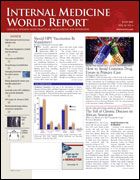Publication
Article
Internal Medicine World Report
Low-Dose Aspirin Not Cardioprotective for Diabetic Patients
Author(s):
Paul A. Gurbei, MD
Exact Dosing in CAD Still Problematic
NEW ORLEANS—Patients with coronary artery disease (CAD) and diabetes are more likely to show resistance to the antiplatelet effects of low-dose aspirin than those without diabetes. As a result, diabetic patients may need higher doses of aspirin to incur cardioprotection, said Paul A. Gurbel, MD, at the American College of Cardiology annual meeting.
"It's amazing that in 2007 we still do not know the appropriate dose of aspirin in patients with coronary artery disease," he marveled. The clinical practice of a "one-size-fits-all" approach must be modified in order to afford maximal protection against cardiovascular events, he added. "If platelet aggregation is a cardiovascular risk factor, why aren't we measuring it?"
In a double-blind, double-crossover study, platelet response to 3 different doses of aspirin—81, 162, or 325 mg—was measured in 120 stable individuals (30 with diabetes, 90 without diabetes) with a history of CAD. Patients were treated with each dose for 4 weeks.
Platelet aggregation was measured at the end of each 4-week period, using 2 assays that are specific for cyclooxygenase (COX)-1 inhibition, and 2 that indirectly measured COX-1 inhibition.
The overall prevalence of aspirin resistance using direct measurement of COX-1 inhibition was <5% during treatment with the 81-mg dose, but resistance was markedly greater in patients with diabetes. Specifically, resistance to the 81-mg dose was 27% in diabetic and 14% in nondiabetic patients when measured by levels of adenosine diphosphate (ADP), 27% and 4%, respectively, when measured by collagen-induced aggregation, 13% and 3% when measured by a point-of-care aspirin assay, and 37% and 17% when measured by urinary thromboxane levels.
"In general, increasing the dose of aspirin in the diabetic patient reduces the prevalence of resistance to a level observed in the nondiabetic patient," said Dr Gurbel, director, Sinai Center for Thrombosis Research, Sinai Hospital, and associate professor of medicine, Johns Hopkins University, Baltimore. At 325 mg/day, there was no overall difference in platelet aggregation between patients with diabetes and those without it.
Aspirin did not, however, have a dose-dependent effect on ADP-induced aggregation in diabetic patients, which suggests "a potential benefit of using ADP-receptor blockers in addition to higher-dose aspirin in selected diabetic patients," he said.
The greater efficacy of higher doses of aspirin in inhibiting platelets in patients with diabetes suggests that "the antiplatelet effect of aspirin is not solely mediated by inhibition of COX-1," said Dr Gurbel. "You see a dose-dependent effect of aspirin on inhibiting platelet aggregation, even after COX-1 is maximally blocked."
Future large-scale trials are needed to evaluate the clinical effects of higher-dose aspirin in patients with diabetes, he concluded.





